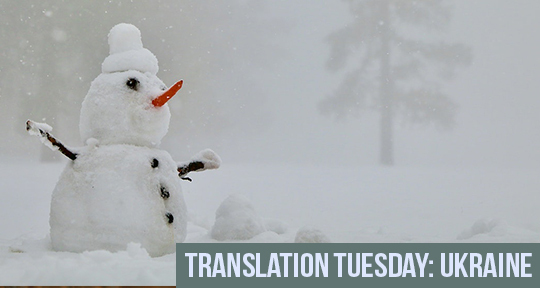This Translation Tuesday, we deliver unflinching poetry from Ukraine that sheds cold light on the child victims of the Russian invasion. On translating Aleksandr Kabanov’s pioneering, at-times enigmatic style, translator Marina Eskina writes: “I chose ‘The Snowman’s Son’ for its expressiveness, force, and, last but not least, because it is more translatable. It includes Biblical references with some overtones from the Russian classical poet Aleksandr Pushkin’s famous poem ‘The Prophet’ which in turn is an allusion to the scene from the Book of Isaiah. My goal as a translator was to preserve these references and allusions without ruining author’s stylistics. Such close reading and search for meanings brought me closer to deciphering Kabanov’s metaphorical universe.”
The Snowman’s Son
The snow of war that flies askew
ignoring all the rules,
it fiercely pierces us through and through
but partly stays the course.
Snow rested the seventh useless wing
on earth’s frozen spine,
the other luckier six it brought
underground to his son.
There, underground, the rink of ice
glitters and melts with the laughs
of kids killed casually by war:
let’s mold them a dad of snow.
But death is eerily cunning,
it swaps the crown for a pail—
amidst the hasty castling—
a carrot for the cross and nails.
I also am a snowman’s son,
despoiled of hearing and sight,
the Holy Ghost’s transmitter
through poems, through ages’ might.
And as I wander among folk
not tired, distraught, amazed,
I’m sure I know who killed the kids
to the last letter of their names.
And snow ascends like ashes,
above the voiceless ruins,
above my dreadful sureness,
above our victorious colors.
Translated from the Russian by Marina Eskina
Aleksandr Kabanov is an award winning poet, editor, and public figure. He lives in Kiev, Ukraine. He is among the most prominent of the generation of Ukrainian poets who came of age in the 1990s after Ukraine gained its independence. He writes in Russian and Ukrainian. His work is translated into several languages and includes fifteen poetry collections, the most recent of which are На языке врага (In the Enemy’s Tongue, 2017) and Исходник (The Original, 2022). Kabanov is the co-founder and editor-in-chief of SHO, a journal of contemporary culture, which was published in Ukraine since 2005 (the project was suspended due to Russia’s invasion of Ukraine). In 2022, Kabanov was awarded the Main Prize at the 18th International Festival of Civic Poetry in Vercelli / Italy for personal achievements in modern literature and for the book La lingua del nemico / In the Enemy’s Tongue (Italy, Interlinea, 2022).
Marina Eskina is the author of four books of poetry in Russian and a book of children’s verse in English, Explanation of a firefly. Her latest book Kradenyi vozdukh (The Stolen Air, 2017) includes original poems alongside translations of Elizabeth Bishop. Her texts and translations regularly appear in online publications and in print around the world. She is a member of the editorial board of the journal Interpoezia. In 1989 she emigrated from Leningrad (now Saint Petersburg), Russia, and currently lives in Boston, USA.
*****
Read more from Translation Tuesdays on the Asymptote blog:

